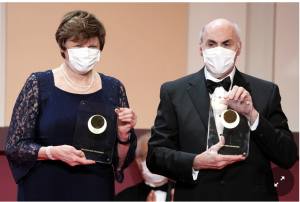The 2020 Nobel Peace Prize was awarded to the United Nations’ World Food Programme for “its efforts to combat hunger, for its contribution to bettering conditions for peace in conflict-affected areas and for acting as a driving force in efforts to prevent the use of hunger as a weapon of war and conflict.”
As the outbreak of coronavirus has contributed to a strong upsurge in the number of victims of hunger in the world, the World Food Programme has demonstrated an impressive ability to intensify its efforts, the Nobel Committee said. The WFP has stated, “Until the day we have a medical vaccine, food is the best vaccine against chaos.”
Also Read | Understanding Noble Laureates Roger Penrose, Reinhard Genzel, Andrea Ghez’s discoveries
The WFP was an active participant in the diplomatic process that culminated in May 2018 in the UN Security Council’s unanimous adoption of Resolution 2417, which for the first time explicitly addressed the link between conflict and hunger, the Committee noted.
The Committee also highlighted that organisations like the World Food Programme do not receive enough funding and financial support.
Also Read | A look at Nobel Prize in Literature winner Louise Gluck’s life and work
According to the Nobel Committee, the WFP is the largest humanitarian that addresses hunger and promotes food security. The WFP in 2019 provided assistance to almost 100 million people in 88 countries, who have faced acute food insecurity and hunger.
Eradicating hunger was adopted as one of the Sustainable Development Goals of the UN and WFP is its primary instrument for realising this goal.
Also Read | Know what Emmanuelle Charpentier and Jennifer A Doudna’s Nobel Prize in Chemistry is for
The Nobel Committee also highlighted that the pandemic has led to a dramatic rise in the number of people living on the brink of starvation in countries such as Yemen, the Democratic Republic of Congo, Nigeria, South Sudan and Burkina Faso, which face the combination of violent conflict.
It noted that in 2019, “135 million people suffered from acute hunger, the highest number in many years. Most of the increase was caused by war and armed conflict.”
“The work of the World Food Programme to the benefit of humankind is an endeavour that all the nations of the world should be able to endorse and support,” the committee said.






